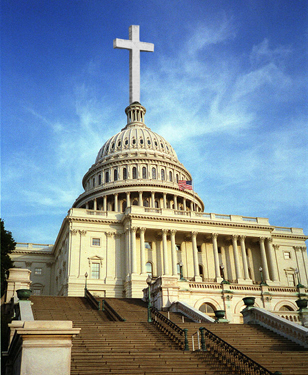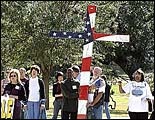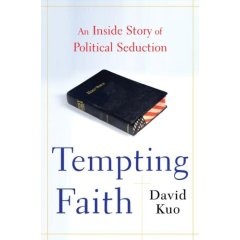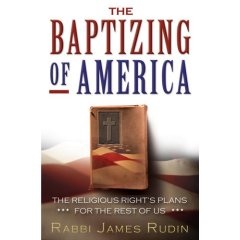
Back to Americans For Morality Home Page
Church and State
 One of the most ridiculous, false, and utterly destructive ideas promoted by prominent Republicans in this country is the idea that our founding fathers never intended a separation of church and state. Senator Tom Delay stated "I don't believe there is a separation of church and state. I think the Constitution is very clear." Sean Hannity seconded, "It doesn't say anywhere in the Constitution this idea of the separation of church and state." Pat Robertson trumpeted:
One of the most ridiculous, false, and utterly destructive ideas promoted by prominent Republicans in this country is the idea that our founding fathers never intended a separation of church and state. Senator Tom Delay stated "I don't believe there is a separation of church and state. I think the Constitution is very clear." Sean Hannity seconded, "It doesn't say anywhere in the Constitution this idea of the separation of church and state." Pat Robertson trumpeted:
"That was never in the Constitution, however much the liberals laugh at me for saying it, they know good and well it was never in the Constitution! Such language only appeared in the constitution of the Communist Soviet Union."
So where did this come from? A bunch of power-hungry liberals? Let's try Thomas Jefferson to begin with:
"I contemplate with sovereign reverence that act of the whole American people which declared that their legislature should make no law respecting an establishment of religion, or prohibiting the free exercise thereof, thus building a wall of separation between church and state."
Later, Jefferson wrote in 1808,
Erecting the "wall of separation between church and state, therefore, is absolutely essential in a free society."
Just because things aren't verbatim in the Constitution doesn't mean they aren't implied there. Many things aren't specifically stated there: "checks and balances", the "right to a fair trial", or having no "taxation without representation."
Let's look at the actual Constitution:
"Congress shall make no law respecting an establishment of religion, or prohibiting the free exercise thereof...
The word "or" means that this phrase has two parts. The first tells us that religious beliefs, private or organized, cannot and should not be controlled by the government. Therefore, the government cannot tell you what to believe or what your religion can teach. The second part teaches us that the government cannot control, enforce, mandate or promote any particular religious doctrines. This is what establishing religion means.
This "establishment clause" was put into the constitution, in part, because of the problems it caused in Europe. Many nations have had religions that depended on the government for support, and the results have been catastrophic to the church. Other nations have established theocracies, denying liberty to its citizens. The founders wanted to keep many of these things from happening here.
Let's make the position of the Democratic Party completely clear:
The separation of church and state is what allows religious liberty to exist.
Look how this contrasts to the religious right. Jerry Falwell stated:
"The idea that religion and politics don't mix was invented by the Devil to keep Christians from running their own country."
Their own country? Was the Constitution a Christian Document? The founders didn't seem to think so. We can start by looking to 1797 when a peace agreement between United States and Muslim leaders in North Africa was forged. Under the authority of George Washington, the final document, known as the Treaty of Tripoli, was approved by the Senate under the leadership of John Adams, the second president. This treaty states, without equivocation, that the "...Government of the United States is not, in any sense, founded on the Christian religion..." By the way, this document was one of the few documents voted on unanimously by the Senate.
The fact is, neither God nor Christianity are mentioned anywhere in the Constitution. At the time, critics actually called it a "godless" document. The words "under God" weren't introduced into the Pledge of Allegiance until the McCarthy era in 1954. Many of our founders were not Christian, and a great number were deists like Benjamin Franklin.
 Criticizing legislators and spiritual leaders of his day, Jefferson opined:
Criticizing legislators and spiritual leaders of his day, Jefferson opined:
" [these leaders,] civil as well as ecclesiastical, who, being themselves but fallible and uninspired men, have assumed dominion over the faith of others, setting up their own opinions and modes of thinking as the only true and infallible, and as such endeavoring to impose them on others, hath established and maintained false religions over the greatest part of the world and through all time."
Madison expressed his opinion of Christianity by asking, "What have been its fruits? More or less in all places, pride and indolence in the Clergy, ignorance and servility in the laity, in both, superstition, bigotry, and persecution."
Thomas Paine stated, "I believe in one God, and no more; and I hope for happiness beyond this life.... I do not believe in the creed professed by the Jewish church, by the Roman church, by the Greek church, by the Turkish church, by the Protestant church, nor by any church that I know of. My own mind is my own church."
Benjamin Franklin believed that the Christian church "has received various corrupting changes, and I have, with most of the present dissenters in England, some doubts as to his (Christ's) divinity; though it is a question I do not dogmatize upon, having never studied it, and think it needless to busy myself with now..."
Hopefully, these few (of many) quotes will suffice to the reader that this nation was never intended to be a "Christian" nation nor were the founders of a like mind regarding religious principles. Their intention was clear from the beginning: to create a nation with true religious freedom.
However, over the years, many have ignored these intentions and legislated against particular faiths. For example, there is the infamous "extermination order" in the state of Missouri, signed into law by Governor Boggs, where all Mormons were to be "utterly exterminated." This is probably one of the reasons why the present leader of The Church of Jesus Chirst of latter-day Saints (Mormons), Gordon B. Hinkley, stated in 1997 that "We draw a strict line of separation of Church and State..." Interestingly, this law in Missouri wasn't taken off the books until Jimmy Carter was president.
 Roger Williams, founder of Rhode Island and of the First Baptist church in America was a staunch proponent of the separation of church and state. He wrote the following:
Roger Williams, founder of Rhode Island and of the First Baptist church in America was a staunch proponent of the separation of church and state. He wrote the following:
"All lawful magistrates in the world ...have, and can have not more power, than fundamentally lies in the bodies of fountains themselves, which power, might, or authority, is not religious, Christian, etc..., but natural, human and civil. And hence, it is true, that Christian captain, Christian merchant, physician, lawyer, pilot, father, master, and (so, consequently,) magistrate, etc..., is no more a captain, merchant, physician, lawyer, pilot, father, master, magistrate, etc...., than a captain, merchant, etc...., of any other conscience or religion... A pagan or anti-Christian pilot may be as skillful to carry the ship to its desired port as any Christian mariner or pilot in the world, and may perform that work with as much safety and speed... (The Bloudy Tenent of Persecution, for cause of Conscience, discussed, in A Conference between Truth and Peace (1644) pp. 398-399)"
Williams believed that the qualities which made a person a good ruler were not the same which made a person a good Christian - indeed, those qualities might at times be in conflict with one another. Expecting leaders to necessarily be good Christians was, in his eyes, a grave mistake which would lead to the ruin of good government and the trivialization of Christian beliefs. He was actually the first person to coin the term "separation of church and state." (see The Complete Writings of Roger Williams, Volume 1, page 108 (1644))
James Madison, the author of the first amendment, wrote in his famous Federalist No. 10:
"A zeal for different opinions concerning religion ...have, in turn, divided mankind into parties, inflamed them with mutual animosity, and rendered them much more disposed to vex and oppress each other than to co-operate for their common good."
He also wrote:
" the number, the industry and the morality of the priesthood, and the devotion of the people have been manifestly increased by the total separation of the church and state ...Strongly guarded...is the separation between religion and government in the Constitution of the United States."
Now if Madison is the one that wrote the first ammendment, don't you think we can take his word for what it means?
With all this information, why do those on the right, like Bishop Carlton Pearson say things like, "We are going to remove the mythical separation of church and state."
But even worse, many who do know their history are calling for the destruction of the Constitution itself. For instance, take Cal Thomas, conservative commentator for the Washington times saying (Oct 23, 1996):
 "We are approaching a time when Christians, especially, may have to declare the social contract between Enlightenment rationalists and Biblical believers - which formed the basis of the constitution written at our nation's founding - null and void."
"We are approaching a time when Christians, especially, may have to declare the social contract between Enlightenment rationalists and Biblical believers - which formed the basis of the constitution written at our nation's founding - null and void."
What are their goals? Read on:
First a quote by Randall Terry (quoted in The News-Sentinel, Fort Wayne, Indiana, August 16, 1993)
"I want you to just let a wave of intolerance wash over you. I want you to let a wave of hatred wash over you. Yes, hate is good.... Our goal is a Christian nation. We have a Biblical duty, we are called by God, to conquer this country. We don't want equal time. We don't want pluralism."
Or this quote from Gary North (Political Polytheism: The Myth of Pluralism, Tyler, TX: Institute for Christian Economics, 1989, p. 87)
 "The long-term goal of Christians in politics should be to gain exclusive control over the franchise. Those who refuse to submit publicly to the eternal sanctions of God by submitting to His Church's public marks of the covenant--baptism and holy communion--must be denied citizenship, just as they were in ancient Israel."
"The long-term goal of Christians in politics should be to gain exclusive control over the franchise. Those who refuse to submit publicly to the eternal sanctions of God by submitting to His Church's public marks of the covenant--baptism and holy communion--must be denied citizenship, just as they were in ancient Israel."
Or try the President of Catholics for Christian Political Action, Gary Potter, who said:
"When the Christian majority takes over this country, there will be no satanic churches, no more free distribution of pornography, no more talk of rights for homosexuals. After the Christian majority takes control, pluralism will be seen as immoral and evil and the state will not permit anybody the right to practice evil."
--Bailey Smith, a founding father of Pat Robertson's Christian Coalition, told 15,000 people (at a Religious Roundtable briefing in Dallas, June 26, 1994):
"With all due respect to those dear people, my friend, God Almighty does not hear the prayer of a Jew."
Do not misunderstand the goals of the Religious Right. If you do, your vote may compromise the peace and power of our Constitution. You may actually be destroying your freedom to practice your own religion.
In addition, when you create laws that force others to live according to your religious beliefs-even if you believe with all your heart that they are right-you take away something that Americans prize even more. That something is freedom. The freedom to choose who they will be. Forced righteousness is always wickedness.
 Current Issues
Current Issues
How many really believe that it should be permissible for the government to help fund the Catholic Church or the Jehovah's Witnesses while all other religious groups have to survive on their own? Does anyone think it would be permissible for the government to force all men to wear yarmulkes, or to prohibit women from wearing jewelry?
What are some of the controversial issues regarding church and state? You might be amazed to know that most things on this website may stem from this issue. History has shown that people will do almost anything in the name of religion. They will destroy the environment, promote slavery, advance wars, abuse animals, or even neglect the poor and sick.
Some of the more controversial issues about church and state include school prayer, school vouchers, putting up the ten commandments in public places, creationism vs evolution, etc...
There has been a lot written about these subjects, but in light of the founder's obvious intentions, how much easier it is to clear up these controversies? Here are some quick questions we can ask about these issues:
School Vouchers
Should you pay taxes to support religious schools? Voucher programs must not create any incentive of a religious school over non-religious schools. If it did, would not the state be favoring one religion over another? And do we really want incentives to keep poor kids out of school? Should taxpayers be not be required to subsidize the spread of religious/moral opinions with which they may strongly disagree?
Posting things like the Ten Commandments on public property
If government officials put up the Decalogue (the ten commandments), will they also post the Five Pillars of Islam, the Four Noble Truths of Buddhism, the Wiccan Rede and the Affirmations of Humanism? The ten commandments are not something upon which all can agree. Four of the ten are clearly religious in nature. People have fought and died because they disagreed over what constitutes a "false god" or over the meaning of the ban on worshipping a "graven image." The history of Europe is replete with examples of the destruction that occurs when government decides to take part in debates like these.
Electioneering in Churches
Should churches be allowed to endorse political candidates? Would you like to sit in your place of worship and listen to partisan political speeches, be solicited for campaign contributions and receive instructions about for whom to vote on Election Day? Because of our Constitution, our Federal law prohibits non-profit churches, temples and mosques from endorsing or opposing candidates for public office. They must refrain from outright electioneering. It is not the job of religious leaders to tell people which candidates to vote for or not vote for.
Creationism and School Prayer
Should schools be used to promote, teach or support matters of faith? Just because you don't know how to reconcile science with your particular religion (like the idea that God used evolutionary processes to create the world), does this mean that you should ban others from studying the observations of the scientific method? If not, do you believe that anyone with a belief should be able to promote their perspectives in school? Check out how ridiculous this can become by reading the website of the Pastafarians or members of the Church of the Flying Spaghetti Monster (www.venganza.org). As for school prayer, anyone can pray anytime they want. People have brains and can pray silently. Wasn't it Jesus Christ that said:
Matt: 6: 5 And when thou prayest, thou shalt not be as the hypocrites are: for they love to pray standing in the synagogues and in the corners of the streets, that they may be seen of men. Verily I say unto you, They have their reward.
6 But thou, when thou prayest, enter into thy closet, and when thou hast shut thy door, pray to thy Father which is in secret; and thy Father which seeth in secret shall reward thee openly.
How many times a day does a Muslim pray? Should the teacher interrupt class all day long to and lead the class in Muslim prayers? The only argument left for those that promote external vocal school prayer, is that we "live in a Christian nation" which argument has already been shown to be spurious.
There are many other issues facing the public, but the most important point that this website is attempting to make is that Democrats aren't against religion when they fight some of these issues, but are more supportive of religious freedom! There is a religious left! The only moral decision one can make is to allow all people to worship how, where, or when they may and to believe whatever they wish to believe without holding captive the free exercise of conscience.
Back to Americans For Morality Home Page
Links and Further Reading
Americans United for the Separation of the Church and State.
www.au.org
 Tempting Faith: An Inside Story of Political Seduction
A book written by David Kuo, deputy director of the White House office of Faith-Based and Community Initiatives under president Bush. Mr. Kuo makes a compelling argument as to why government and religion don't mix.
Tempting Faith: An Inside Story of Political Seduction
A book written by David Kuo, deputy director of the White House office of Faith-Based and Community Initiatives under president Bush. Mr. Kuo makes a compelling argument as to why government and religion don't mix.
MSNBC's Keith Olberman brings us this two part video commentary based on the above book, Tempting Faith:
Part One:
http://www.youtube.com/watch?v=D-0zoS0bplI
Part Two:
http://www.youtube.com/watch?v=CNkUKTXMDkc
 Piety & Politics: The Right-Wing Assault on Religious Freedom Written by Reverend Barry Lynn, executive director of Americans United for the Separation of the Church and State. Read an interview with this Reverend here entitled Separation Please
Piety & Politics: The Right-Wing Assault on Religious Freedom Written by Reverend Barry Lynn, executive director of Americans United for the Separation of the Church and State. Read an interview with this Reverend here entitled Separation Please
 The Baptizing of America Written by Rabbi James Rudin. Here, at last, are the war plans of America's own religious extremists. The Baptizing of America exposes the systematic campaign by Christian fundamentalists to co-opt and take over every "room" of American society from the bedroom to the school room, hospital room, operating room, courtroom, work room, reading room and newsroom.
This book focuses on the aggressive and well-funded war currently being led by fundamentalist Christians to "baptize America." It is a prolonged battle that will determine whether the United States remains a spiritually vital country ‹ but one without an officially established religion ‹ or whether it will become "Christianized," a "faith-based nation" in which fundamentalist Christianity will be the sole legal dominant religion throughout the land. The war will decide whether America follows the path of many other nations and becomes a theocracy, not unlike Iran and the former Taliban regime in Afghanistan.
The Baptizing of America Written by Rabbi James Rudin. Here, at last, are the war plans of America's own religious extremists. The Baptizing of America exposes the systematic campaign by Christian fundamentalists to co-opt and take over every "room" of American society from the bedroom to the school room, hospital room, operating room, courtroom, work room, reading room and newsroom.
This book focuses on the aggressive and well-funded war currently being led by fundamentalist Christians to "baptize America." It is a prolonged battle that will determine whether the United States remains a spiritually vital country ‹ but one without an officially established religion ‹ or whether it will become "Christianized," a "faith-based nation" in which fundamentalist Christianity will be the sole legal dominant religion throughout the land. The war will decide whether America follows the path of many other nations and becomes a theocracy, not unlike Iran and the former Taliban regime in Afghanistan.
Back to Americans For Morality Home Page

 One of the most ridiculous, false, and utterly destructive ideas promoted by prominent Republicans in this country is the idea that our founding fathers never intended a separation of church and state. Senator Tom Delay stated "I don't believe there is a separation of church and state. I think the Constitution is very clear." Sean Hannity seconded, "It doesn't say anywhere in the Constitution this idea of the separation of church and state." Pat Robertson trumpeted:
One of the most ridiculous, false, and utterly destructive ideas promoted by prominent Republicans in this country is the idea that our founding fathers never intended a separation of church and state. Senator Tom Delay stated "I don't believe there is a separation of church and state. I think the Constitution is very clear." Sean Hannity seconded, "It doesn't say anywhere in the Constitution this idea of the separation of church and state." Pat Robertson trumpeted: Criticizing legislators and spiritual leaders of his day, Jefferson opined:
Criticizing legislators and spiritual leaders of his day, Jefferson opined: Roger Williams, founder of Rhode Island and of the First Baptist church in America was a staunch proponent of the separation of church and state. He wrote the following:
Roger Williams, founder of Rhode Island and of the First Baptist church in America was a staunch proponent of the separation of church and state. He wrote the following: "We are approaching a time when Christians, especially, may have to declare the social contract between Enlightenment rationalists and Biblical believers - which formed the basis of the constitution written at our nation's founding - null and void."
"We are approaching a time when Christians, especially, may have to declare the social contract between Enlightenment rationalists and Biblical believers - which formed the basis of the constitution written at our nation's founding - null and void." "The long-term goal of Christians in politics should be to gain exclusive control over the franchise. Those who refuse to submit publicly to the eternal sanctions of God by submitting to His Church's public marks of the covenant--baptism and holy communion--must be denied citizenship, just as they were in ancient Israel."
"The long-term goal of Christians in politics should be to gain exclusive control over the franchise. Those who refuse to submit publicly to the eternal sanctions of God by submitting to His Church's public marks of the covenant--baptism and holy communion--must be denied citizenship, just as they were in ancient Israel." Current Issues
Current Issues Tempting Faith: An Inside Story of Political Seduction
A book written by David Kuo, deputy director of the White House office of Faith-Based and Community Initiatives under president Bush. Mr. Kuo makes a compelling argument as to why government and religion don't mix.
Tempting Faith: An Inside Story of Political Seduction
A book written by David Kuo, deputy director of the White House office of Faith-Based and Community Initiatives under president Bush. Mr. Kuo makes a compelling argument as to why government and religion don't mix. Piety & Politics: The Right-Wing Assault on Religious Freedom Written by Reverend Barry Lynn, executive director of Americans United for the Separation of the Church and State. Read an interview with this Reverend here entitled Separation Please
Piety & Politics: The Right-Wing Assault on Religious Freedom Written by Reverend Barry Lynn, executive director of Americans United for the Separation of the Church and State. Read an interview with this Reverend here entitled Separation Please  The Baptizing of America Written by Rabbi James Rudin. Here, at last, are the war plans of America's own religious extremists. The Baptizing of America exposes the systematic campaign by Christian fundamentalists to co-opt and take over every "room" of American society from the bedroom to the school room, hospital room, operating room, courtroom, work room, reading room and newsroom.
This book focuses on the aggressive and well-funded war currently being led by fundamentalist Christians to "baptize America." It is a prolonged battle that will determine whether the United States remains a spiritually vital country ‹ but one without an officially established religion ‹ or whether it will become "Christianized," a "faith-based nation" in which fundamentalist Christianity will be the sole legal dominant religion throughout the land. The war will decide whether America follows the path of many other nations and becomes a theocracy, not unlike Iran and the former Taliban regime in Afghanistan.
The Baptizing of America Written by Rabbi James Rudin. Here, at last, are the war plans of America's own religious extremists. The Baptizing of America exposes the systematic campaign by Christian fundamentalists to co-opt and take over every "room" of American society from the bedroom to the school room, hospital room, operating room, courtroom, work room, reading room and newsroom.
This book focuses on the aggressive and well-funded war currently being led by fundamentalist Christians to "baptize America." It is a prolonged battle that will determine whether the United States remains a spiritually vital country ‹ but one without an officially established religion ‹ or whether it will become "Christianized," a "faith-based nation" in which fundamentalist Christianity will be the sole legal dominant religion throughout the land. The war will decide whether America follows the path of many other nations and becomes a theocracy, not unlike Iran and the former Taliban regime in Afghanistan.